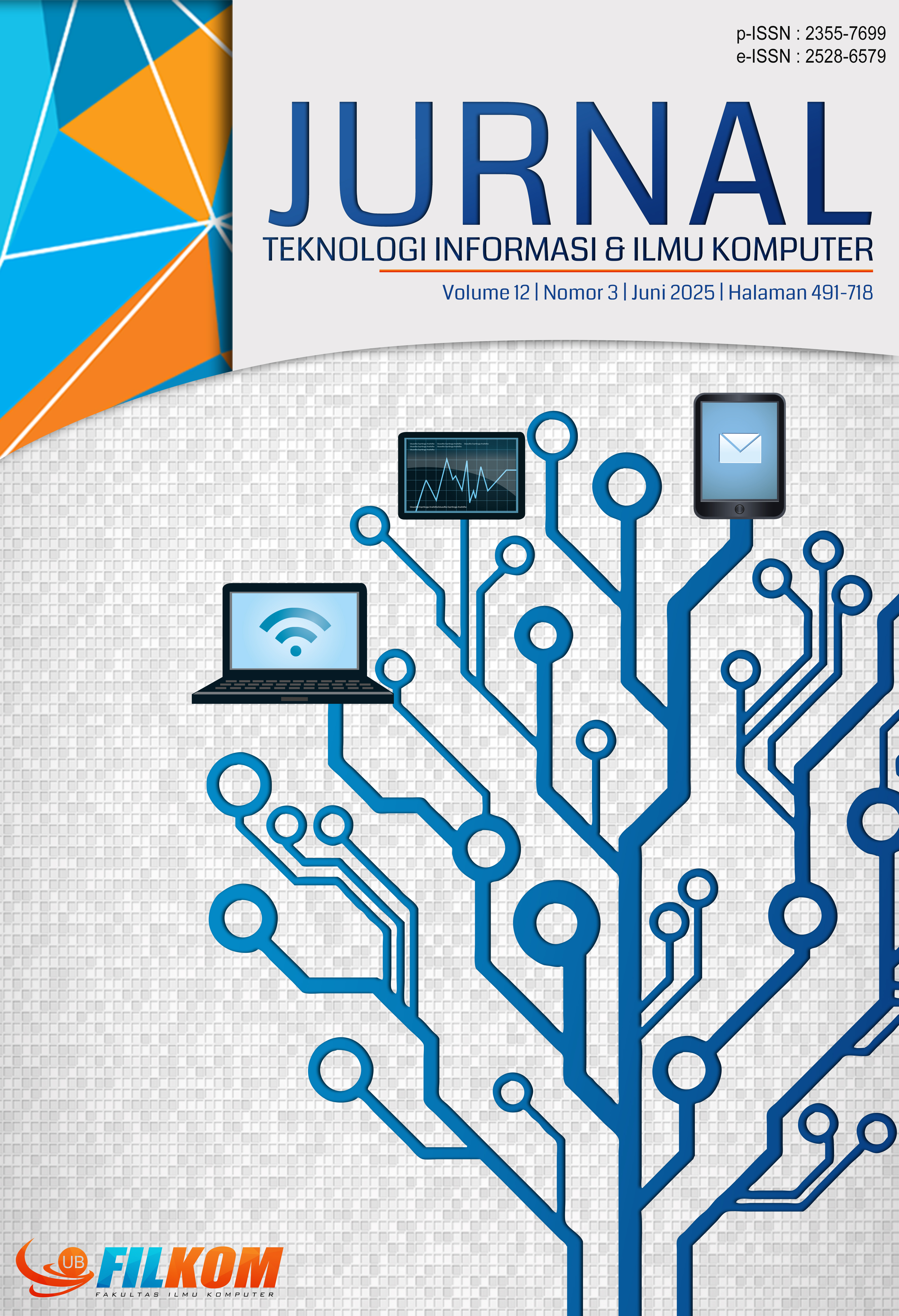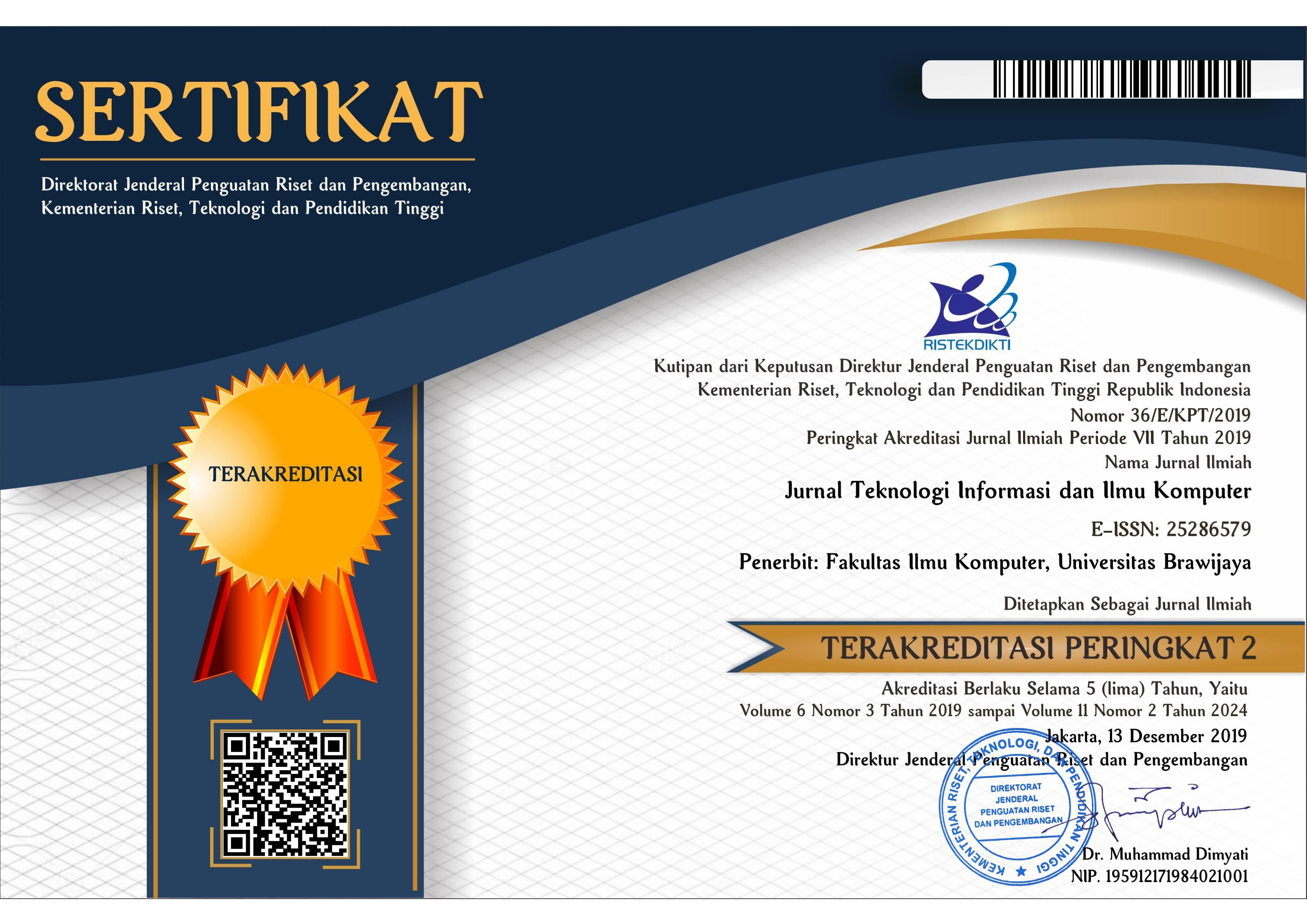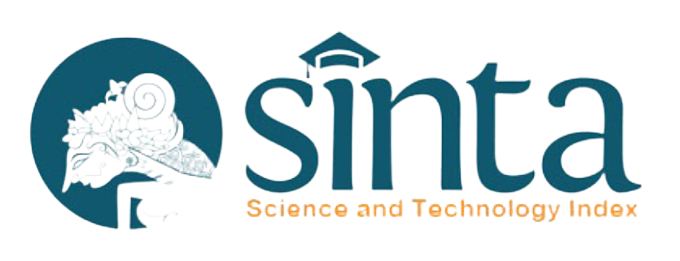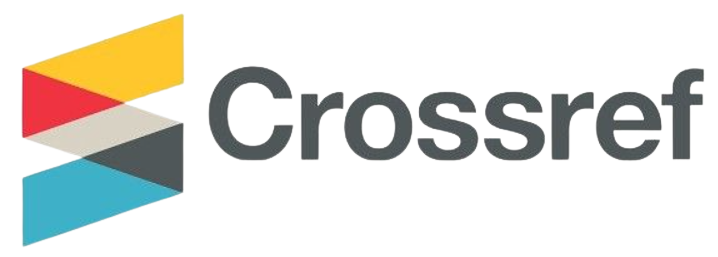Pemodelan Pengaruh E-Learning Pada Performa Akademik Mahasiswa Dengan Technology Acceptance Model Dan Analisis Structural Equation Modelling
DOI:
https://doi.org/10.25126/jtiik.2025128229Kata Kunci:
Moodle, TAM, Tingkat Kepercayaan Diri, Performa Akademik, SEMAbstrak
E-learning telah menjadi alat yang penting dalam pendidikan tinggi, memungkinkan perguruan tinggi untuk menyediakan aksesibilitas dan fleksibilitas dalam pengajaran dan pembelajaran. Salah satu platform e-learning yang populer adalah Moodle yang digunakan oleh banyak universitas di indonesia. Namun, penggunaan Moodle di universitas belum banyak diteliti secara mendalam, terutama dalam konteks pengaruh e-learning terhadap indeks prestasi akademik. Oleh karena itu, penelitian ini bertujuan untuk melakukan pengujian e-learning Moodle di lingkungan Universitas Buddhi Dharma yang berlokasi di Tangerang dengan metode Technology Acceptance Model (TAM) menggunakan lima variabel Perceive Usefulness (PU), Perceive Ease of Use (PEOU), Attention Towards Using (ATU), Behaviour Intention to Use (BITU), dan Actual System Using (ASU) ditambah dengan dua variabel lain yaitu Level of Confidence (LC) dan Academic Performance (AP). Seluruh variabel dianalisis menggunakan Structural Equation Modelling (SEM). Hasilnya menunjukkan bahwa persepsi kemudahan penggunaan (PEOU), dan persepsi kebermanfaatan (PU) memiliki pengaruh positif secara signifikan terhadap sikap (ATT) dan niat perilaku pengguna (BITU) serta aktual penggunaan sistem (ASU) dalam Moodle sebagai platform e-learning dengan nilai t-statistik yang melebihi nilai t-tabel dan p-value. Namun dalam hal ini penerimaan teknologi e-learning yang baik tidak mempengaruhi tingkat kepercayaan diri (LC) dan performa akademik pengguna (AP) secara aktual.
Abstract
E-learning has become an essential tool in higher education, enabling universities to provide accessibility and flexibility in teaching and learning. One of the popular e-learning platforms is Moodle, which many universities in Indonesia use. However, the use of Moodle at universities has yet to be studied in depth, especially in the context of the influence of e-learning on the academic performance index. Therefore, this research aims to test Moodle e-learning in the Buddhi Dharma University environment located in Tangerang using the Technology Acceptance Model (TAM) method using the five variables Perceive Usefulness (PU), Perceive Ease of Use (PEOU), Attention Towards Using (ATU), Behavioral Intention to Use (BITU), and Actual System Using (ASU) plus two other variables, namely Level of Confidence (LC) and Academic Performance (AP). All variables were analyzed using Structural Equation Modeling (SEM). The results show that perceived ease of use (PEOU) and perceived usefulness (PU) have a significant positive influence on attitudes (ATT) and user behavioral intentions (BITU) as well as actual system use (ASU) in Moodle as an e-learning platform with a value of t -statistics that exceed the t-table value and p-value. However, in this case, a good acceptance of e-learning technology does not affect the Confidence Level (LC) and user Academic Performance (AP).
Downloads
Referensi
AJZEN, I. dan FISHBEIN, M., 2002. Understanding Attitudes and Predicting Social Behavior. [online] Upper Saddle River, NJ : Prentice-Hall. Available at: <https://www.worldcat.org/title/understanding-attitudes-and-predicting-social-behavior/oclc/881933662?referer=di&ht=edition>.
AKBARI, O. dan SAHIBZADA, J., 2020. Students’ Self-Confidence and Its Impacts on Their Learning Process. American International Journal of Social Science Research, 5(1), pp.1–15. https://doi.org/10.46281/aijssr.v5i1.462.
AL-AJLAN, A. dan ZEDAN, H., 2008. Why moodle. Proceedings of the IEEE Computer Society Workshop on Future Trends of Distributed Computing Systems, (May), pp.58–64. https://doi.org/10.1109/FTDCS.2008.22.
ALHADABI, A. dan KARPINSKI, A.C., 2020. Grit, self-efficacy, achievement orientation goals, and academic performance in University students. International Journal of Adolescence and Youth, [online] 25(1), pp.519–535. https://doi.org/10.1080/02673843.2019.1679202.
BURAC, M.A.P., FERNANDEZ, J.M., CRUZ, M.M.A. dan CRUZ, J. DELA, 2019. Assessing the impact of e-learning system of higher education institution’s instructors and students. IOP Conference Series: Materials Science and Engineering, 482(1). https://doi.org/10.1088/1757-899X/482/1/012009.
BURROWS, T.L., WHATNALL, M.C., PATTERSON, A.J. dan HUTCHESSON, M.J., 2017. Associations between dietary intake and academic achievement in college students: A systematic review. Healthcare (Switzerland), 5(4). https://doi.org/10.3390/healthcare5040060.
CHEUNG, G.W., COOPER-THOMAS, H.D., LAU, R.S. dan WANG, L.C., 2023. Reporting reliability, convergent and discriminant validity with structural equation modeling: A review and best-practice recommendations. [online] Asia Pacific Journal of Management, Springer US. https://doi.org/10.1007/s10490-023-09871-y.
DAVIS, F.D., 1989. Perceived Usefullness, Perceived Ease of Use, and User Acceptance of Information Technology. JSTOR, 13(3), pp.319–340. https://doi.org/10.5962/bhl.title.33621.
DAVIS, F.D., BAGOZZI, R.P. dan WARSHAW, P.R., 1989. User Acceptance of Computer Technology: A Comparison of Two Theoretical Models. Management Science, 35(8), pp.982–1003. https://doi.org/10.1287/mnsc.35.8.982.
FATMA, F., 2015. A Study of Self-confidence of Adolescents in Relation to Their Gender, Locality, and Academic Achievement. International Journal of Applied Research, [online] 1(12), pp.541–544. Available at: .
FERDINAND, A., 2002. Structural Equation Model Dalam Penelitian Manajemen. 2nd ed. Semarang: Fakultas Ekonomi Universitas Diponegoro.
GAMAGE, S.H.P.W., AYRES, J.R. dan BEHREND, M.B., 2022. A systematic review on trends in using Moodle for teaching and learning. International Journal of STEM Education, [online] 9(1). https://doi.org/10.1186/s40594-021-00323-x.
GARSON, G.D., 2016. Partial Least Squares: Regression & Structural Equation Models. Statistical Associates Publishing. https://doi.org/10.1201/b16017-6.
HAIR, J.F., BABIN, B.J., ANDERSON, R.E. dan BLACK, W.C., 2019a. MULTIVARIATE DATA ANALYSIS. 8th ed. Cengage Learning.
HAIR, J.F., HULT, G.T.M., RINGLE, C.M., SARSTEDT, M., DANKS, N.P. dan RAY, S., 2021a. Partial Least Squares Structural Equation Modeling (PLS-SEM) Using R. Practical Assessment, Research and Evaluation.
HAIR, J.F., RISHER, J.J., SARSTEDT, M. dan RINGLE, C.M., 2019b. When to use and how to report the results of PLS-SEM. European Business Review, 31(1), pp.2–24. https://doi.org/10.1108/EBR-11-2018-0203.
HAIR, J.F., SARSTEDT, M., HOPKINS, L. dan KUPPELWIESER, V.G., 2014. Partial least squares structural equation modeling (PLS-SEM): An emerging tool in business research. European Business Review, 26(2), pp.106–121. https://doi.org/10.1108/EBR-10-2013-0128.
HAIR, J.F.J., HULT, G.T.M., RINGLE, C.M. dan SARSTEDT, M., 2021b. A Primer on Partial Least Squares Structural Equation Modeling (PLS-SEM). Third ed. [online] SAGE Publications. Available at: <https://us.sagepub.com/en-us/nam/a-primer-on-partial-least-squares-structural-equation-modeling-pls-sem/book270548#preview>.
JAWAD, Y.A.L.A. dan SHALASH, B., 2020. The impact of e-learning strategy on students’ academic achievement case study: Al-quds open university. International Journal of Higher Education, 9(6), pp.44–53. https://doi.org/10.5430/ijhe.v9n6p44.
JEBB, A.T., NG, V. dan TAY, L., 2021. A Review of Key Likert Scale Development Advances: 1995–2019. Frontiers in Psychology, 12(May), pp.1–14. https://doi.org/10.3389/fpsyg.2021.637547.
KOLEKAR, S. V., PAI, R.M. dan MANOHARA PAI, M.M., 2018. Adaptive User Interface for Moodle based E-learning System using Learning Styles. Procedia Computer Science, 135, pp.606–615. https://doi.org/10.1016/j.procs.2018.08.226.
MATEI, A. dan VRABIE, C., 2013. E-learning Platforms Supporting the Educational Effectiveness of Distance Learning Programmes: A Comparative Study in Administrative Sciences. Procedia - Social and Behavioral Sciences, 93, pp.526–530. https://doi.org/10.1016/j.sbspro.2013.09.233.
MOODLE, 2020. Moodle in numbers during Covid-19. [online] Available at: <https://moodle.com/news/moodle-in-numbers-during-covid-19/> [Accessed 11 June 2023].
MOODLE, A., 2023. About Moodle. [online] Available at: <https://docs.moodle.org/402/en/About_Moodle> [Accessed 11 June 2023].
NATASIA, S.R., WIRANTI, Y.T. dan PARASTIKA, A., 2022. ScienceDirect ScienceDirect Acceptance Acceptance analysis analysis of of NUADU NUADU as as e-learning e-learning platform platform using using the the Technology Acceptance Model ( TAM ) approach Technology Acceptance Model ( TAM ) approach. Procedia Computer Science, [online] 197(2021), pp.512–520. https://doi.org/10.1016/j.procs.2021.12.168.
PATRA, S.K., SUNDARAY, B.K. dan MAHAPATRA, D.M., 2021. Are university teachers ready to use and adopt e-learning system? An empirical substantiation during COVID-19 pandemic. Quality Assurance in Education, [online] 29(4), pp.509–522. https://doi.org/10.1108/QAE-12-2020-0146.
PENG, M.H. dan HWANG, H.G., 2021. An empirical study to explore the adoption of e-learning social media platform in taiwan: An integrated conceptual adoption framework based on technology acceptance model and technology threat avoidance theory. Sustainability (Switzerland), 13(17). https://doi.org/10.3390/su13179946.
PHUTELA, N. dan DWIVEDI, S., 2020. A qualitative study of students’ perspective on e-learning adoption in India. Journal of Applied Research in Higher Education, 12(4), pp.545–559. https://doi.org/10.1108/JARHE-02-2019-0041.
RAKIC, S., PAVLOVIC, M., SOFTIC, S., LALIC, B. dan MARJANOVIC, U., 2019. An Evaluation of Student Performance at e-Learning Platform. In: 2019 17th International Conference on Emerging eLearning Technologies and Applications (ICETA). [online] pp.681–686. https://doi.org/10.1109/ICETA48886.2019.9040066.
RINGLE, C.M., WENDE, S. dan BECKER, J.-M., 2022. SmartPLS 4. [online] Available at: <https://www.smartpls.com> [Accessed 29 June 2023].
ROMERO, E., GARCÍA, L. dan CEAMANOS, J., 2021. Moodle and Socrative quizzes as formative aids on theory teaching in a chemical engineering subject. Education for Chemical Engineers, 36, pp.54–64. https://doi.org/10.1016/j.ece.2021.03.001.
RÖNKKÖ, M. dan CHO, E., 2022. An Updated Guideline for Assessing Discriminant Validity. Organizational Research Methods, https://doi.org/10.1177/1094428120968614.
SALEH, S.S. dan NAT, M., 2022. Sustainable Adoption of E-Learning from the TAM Perspective. Sutainability MDPI. [online] Available at: <https://www.mdpi.com/2071-1050/14/6/3690>.
SALMA, A., FITRIANDI, D. dan SYAFRIANDI, S., 2020. Structural Equation Modelling : The Affecting of Learning Attitude on Learning Achievement of Students Structural Equation Modelling : The Affecting of Learning Attitude on Learning Achievement of Students. Journal of Physics: Conference Series, [online] 1554. https://doi.org/10.1088/1742-6596/1554/1/012056.
STATS, M., 2023. Moodle Statistics. [online] Available at: <https://stats.moodle.org/> [Accessed 11 June 2023].
SZIRMAI, M., 2020. Evaluation of Moodle Features at Kajaani University of Applied Sciences – Case Study. Electronic Journal of Foreign Language Teaching, 17, pp.190–204.
TEGEGNE, K.M., 2014. The Influence of E-Learning on the Academic Performance of Mathematics Students in Fundamental Concepts of Algebra Course: The Case in Jimma University. Ethiopian Journal of Education and Sciences, 9(2), pp.41–59.
YUNIATO, J., 2012. Titik Persentase Distribusi t. Http://Junaidichaniago.Wordpress.Com.
Unduhan
Diterbitkan
Terbitan
Bagian
Lisensi
Hak Cipta (c) 2025 Jurnal Teknologi Informasi dan Ilmu Komputer

Artikel ini berlisensiCreative Commons Attribution-ShareAlike 4.0 International License.

Artikel ini berlisensi Creative Common Attribution-ShareAlike 4.0 International (CC BY-SA 4.0)
Penulis yang menerbitkan di jurnal ini menyetujui ketentuan berikut:
- Penulis menyimpan hak cipta dan memberikan jurnal hak penerbitan pertama naskah secara simultan dengan lisensi di bawah Creative Common Attribution-ShareAlike 4.0 International (CC BY-SA 4.0) yang mengizinkan orang lain untuk berbagi pekerjaan dengan sebuah pernyataan kepenulisan pekerjaan dan penerbitan awal di jurnal ini.
- Penulis bisa memasukkan ke dalam penyusunan kontraktual tambahan terpisah untuk distribusi non ekslusif versi kaya terbitan jurnal (contoh: mempostingnya ke repositori institusional atau menerbitkannya dalam sebuah buku), dengan pengakuan penerbitan awalnya di jurnal ini.
- Penulis diizinkan dan didorong untuk mem-posting karya mereka online (contoh: di repositori institusional atau di website mereka) sebelum dan selama proses penyerahan, karena dapat mengarahkan ke pertukaran produktif, seperti halnya sitiran yang lebih awal dan lebih hebat dari karya yang diterbitkan. (Lihat Efek Akses Terbuka).















